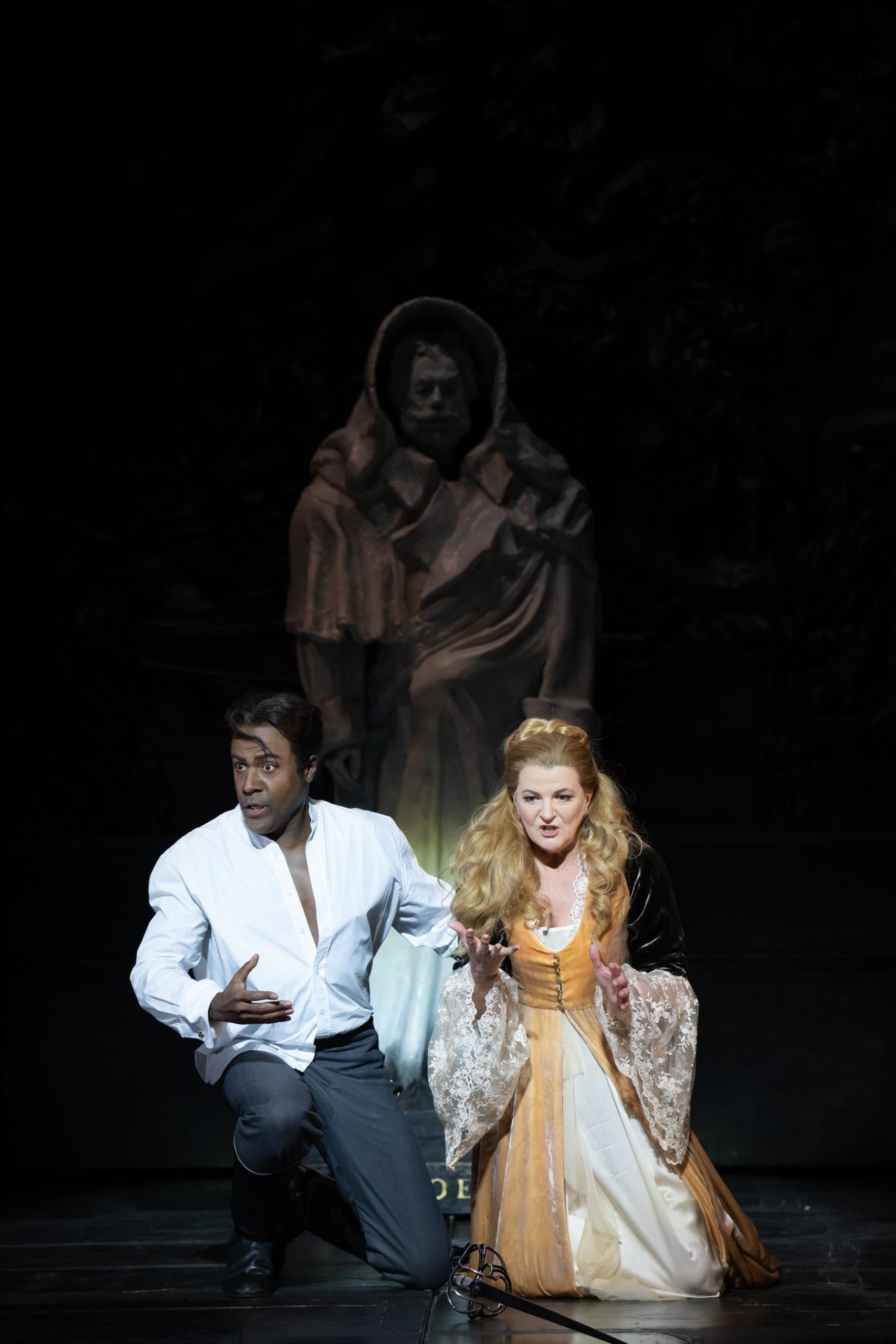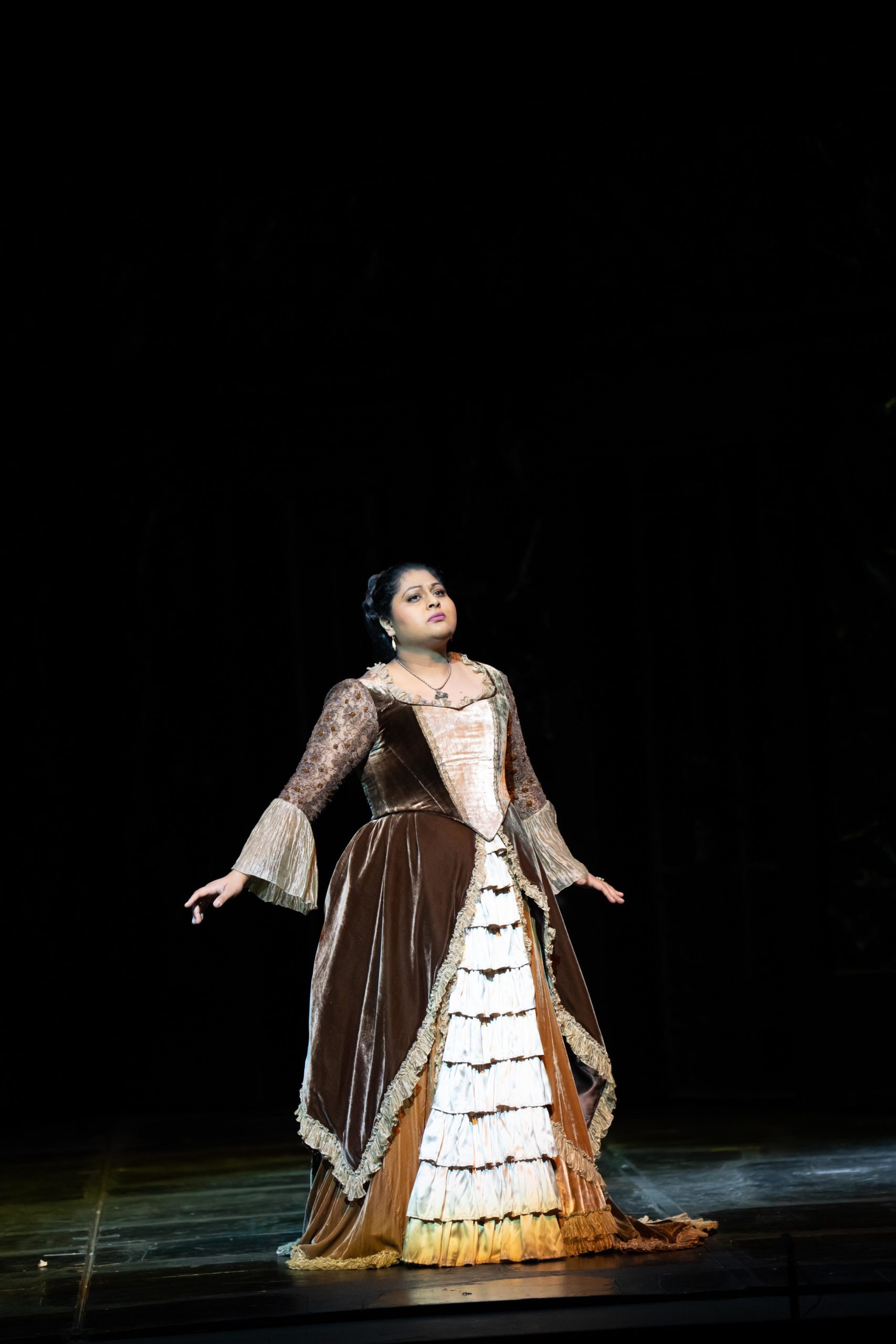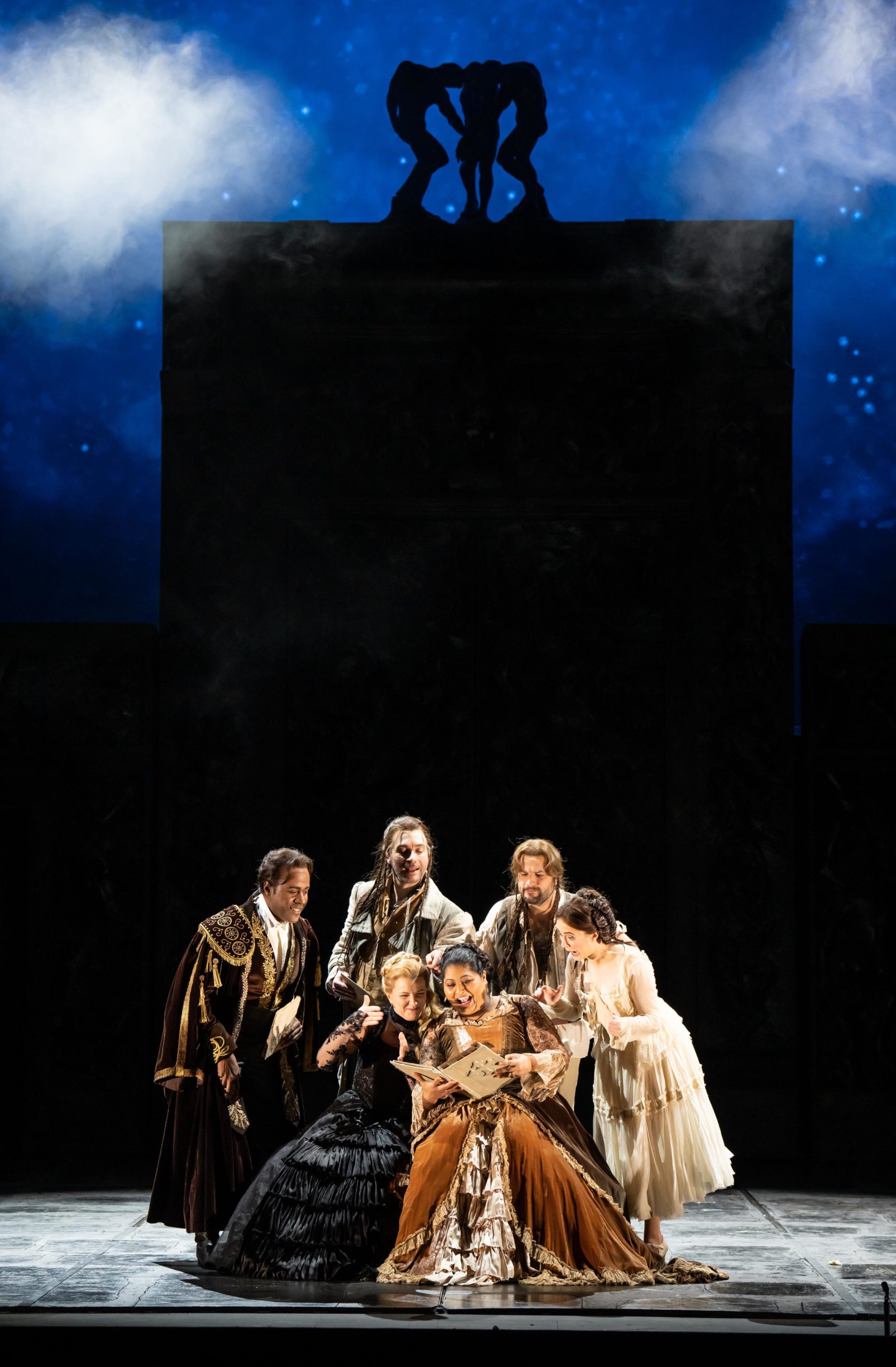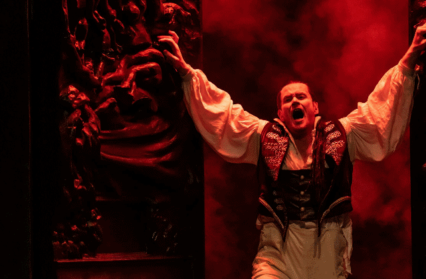Mozart’s Don Giovanni combines heavenly music with subject-matter the power of which to offend has been sharpened by contemporary events. Nigel Jarrett was at the Wales Millennium Centre in Cardiff for the revival of a production by Welsh National Opera.
Sexual politics, late-developing enlightenment, and less insistent attitudes before them have long closed the gap between the comic and the serious in Mozart’s opera Don Giovanni to the extent that its immortal music is fast becoming an exclusive virtue and its length – around three hours – a defect. Not that one should side with culture-cancellers in shooting the messenger who depicts for us a rapist of barbarous sexual appetite, his weary and put-upon servant, and his eventual come-uppance. But among today’s audiences the comedy raises barely a titter and the braggadocio is morally repugnant. That’s because seduction is no longer viewed as an innocent element of romance but as plain assault, despite the ambivalence of some of its victims, who connive at the sex but cavil at the desertion. In terms of a corrupting relationship, Don Giovanni and his sidekick Leporello have become reverse historical reflections of Epstein and Maxwell.

One such victim, and the feistiest woman on stage in the opera itself, and especially in this revival by WNO’s Caroline Chaney of director John Caird’s 2011 production, is Donna Elvira. Giovanni has abandoned her along with the hundreds of others listed in manservant Leporello’s catalogue but she has come seeking revenge and possibly a rekindling of their mutual fervour. She was sung on this third outing for the production in the company’s Spring season by Meeta Raval, whose passionate Ah, chi mi dice, mai quel barbaro dov’è? burst into the proceedings to light the fuse of her suitor’s downfall against the portents of John Napier’s somewhat clunking set based on Rodin’s Gates of Hell bronze. It closes in on him and everyone else as an oppressive mechanism, and is present throughout, including at the pre-nuptials of Masetto and Zerlina. Elvira is one mixed-up lady, seeing Giovanni as both traitorous and the possible source of a rekindled and redemptive love.
But ‘love’ is a misnomer in Giovanni’s book. Harriet Eyley’s elfin Zerlina might have been Elvira’s bucolic counterpart in being both impressed and overwhelmed by Giovanni’s attentions; Caird cast the countryside frolics as some cheery rite of spring, complete with headset antlers and simulated congress. Like almost all the other principal singing, Eyley’s hovered between borderline and fully-achieved Mozartian, though her charm made up for anything lacking in her two sweetly delivered arias. Eyley and James Platt’s Commendatore apart, the cast on this occasion was the alternative one that will share touring duties with the first night’s line-up. It seemed to be doing everything right in following the script, yet the musical dynamic was often weak; either Swedish conductor Tobias Ringborg appeared to be squandering opportunities for dramatic accent and emphasis, or the uniformity of the singing led him to hold back. He could have helped the cast achieve goals that were sometimes a tad out of reach. This takes nothing away from the effort of Chaney and the young cast in demonstrating commendable presence of mind as movement was matched with vocal delivery. The appearance of James Platt’s Commendatore in the final stages should have been the embodiment of divine vengeance that sucks Giovanni into the fiery abode of the damned, but more than that gives a narrative biff to a story that has become an excuse for episodes of vocal enchantment and articulacy. Without greater variety of utterance throughout the cast, the louring atmosphere, the ever-more-desperate attempts by Giovanni to keep his pecker up, and the end itself – the entrance of Giovanni to an underground vault full of illuminated dry ice – flooded the detail and threatened to sweep it aside.

But detail there was, if not chivvied above the gloom by a brighter and more focused orchestral input. Leporello’s basso buffo aria Madamina, il catalago è questo (the list of Giovanni’s conquests) was clearly delivered by Joshua Bloom with a smidgen of shame; and Linda Richardson’s elegant and dignified Donna Anna was a match for Or sai chi l’onore, the demanding recitative and aria Mozart gifts her as she recalls the incident in which Giovanni killed her father after attempting to rape her. Anna’s flowing Non mir di, a reproach to betrothed Don Ottavio when the murder is still on her mind and he wants to talk about marriage, was a reminder that Mozart and his librettist, Lorenzo da Ponte, were attuned to the havoc wreaked by sexual predation: for examples, here in Anna’s need for a year’s grace before the wedding while she grieves and recovers from her ordeal, and Elvira’s entertaining the prospect of life in a nunnery to bury her confusion and distress. Kenneth Tarver’s reserved Don Ottavio almost makes the character sound in thrall to the ardent Il mio tesoro intanto at the point in the opera where vocal allure has long threatened to subvert the story’s pace and where his stolid manner momentarily crumbles.

Duncan Rock’s Giovanni was so good at trying to keep afloat while all were closing in on him that the duet in which he begins seducing Zerlina, Là ci darem la mano, convinced us that where his patience deserted him he must have been a tuneful wooer. Vocally, he gave the clever impression of a man already enervated by a life of debauchery but still with an almost febrile physical presence that no doubt enabled him to turn on the charm for Deh, vieni alla finestra, as he serenades Elvira’s maid accompanied bizarrely by a monk with a mandolin. But there was little evidence, difficult anyway for a director or a singer to achieve, of the idea that Giovanni cannot help himself. James Atkinson (Masetto) measured up well to the production’s physicality. Platt sang with spirit from inside his stiff lapidary get-up and despite the underwhelming greeting with which Ringborg and the orchestra marked his late appearance; he would have been less constricted as a contemporary living sculpture. The ensembles, from the agitated opening trio of Anna, Giovanni and Leporello to the final moralising sextet, were never less than united. The latter brings ‘closure’, as they say, but gives no hint that the man who could ‘smell’ the presence of a woman and refused to love one because it would be cruel to all the others was neither alone in his depravity nor a repentant victim of hell fire. Caird’s production captures that and had no mission to fudge it.
Nigel Jarrett is a winner of the Rhys Davies Prize and the inaugural Templar Shorts Prize, both for short fiction. He is represented in the Library of Wales’s anthology of 20th– and 21st-century short stories, and is the author of a novel, a poetry collection and two full collections of stories. In 2019, Templar published his short-fiction pamphlet A Gloucester Trilogy. This year Saron Publishing will bring out his novel-type work of fiction called Notes From the Superhorse Stable and Cockatrice Books his fourth story collection, Five Go to Switzerland. He writes and reviews for Wales Arts Review, Jazz Journal, Acumen poetry magazine and others, and he lives in Monmouthshire.
Don Giovanni Header Photo Courtesy of Bill Cooper.
Welsh National Opera Welsh National Opera Welsh National Opera



 Enjoyed this article? Support our writers directly by buying them a coffee and clicking this link.
Enjoyed this article? Support our writers directly by buying them a coffee and clicking this link.







